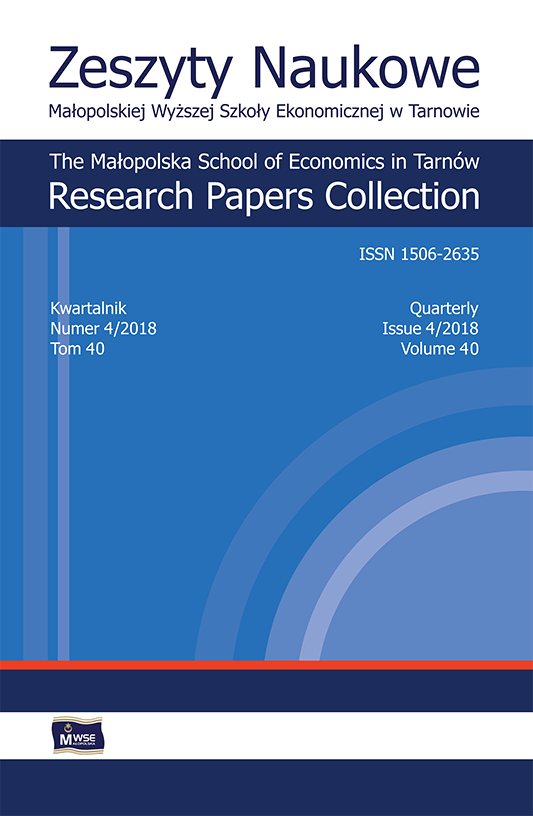Abstract
Accommodation base is one of the key elements of tourism development. The level of development, quality or diversity of its offer significantly determines the level of tourist services in a given country. Hospitality as a part of the accommodation base is not a homogeneous concept. There are many types of hotels on the tourist market: resort, business, city or spa type hotels. Among the many types of hotels operating on the market, it is worth mentioning historical hotels. These objects stand out, among others, location in historic places such as castles, palaces or courts and sublime offer. The aim of the article is to present the issue of management of historical hotels in Poland on the example of one of the most well-known organizations in this segment, i.e. the Historical Hotels of Poland (Heritage Hotels Poland). The publication was based on available book literature, statistical data, netographic data, as well as on the basis of information obtained from the members of the discussed organization. The article presents the roots of historical hotel industry in Poland and in the world. The development and evolution of historical hotels over the years has been discussed. The work also describes the most important historical hotel organizations in the world and in Poland. They were characterized and the most important goals of their activities were discussed. Particular attention in this publication is devoted to one of the youngest historical hotel organizations in Poland, the Historical Heritage Hotels Foundation (Heritage Hotels Poland). The publication discusses the circumstances of its establishment, and describes the system of values that are guided in its activities. The most important benefits resulting from membership in this organization were also presented. Also, it was not forgotten about describing its most important achievements or consolidation with another organization of historical hotels. The research method used in the article was literary criticism, telephone interview and analysis of existing data. The thesis to be put in the work is the assumption that the Historical Hotels of Poland (HHP) discussed here is an important element affecting the efficiency and effectiveness of hotel management in Poland.
References
Burzec, M. (2003). Zabytki potrzebują promocji. Świat Hoteli, 10.
View in Google Scholar
Bzowski, K. (2017). Sztuka gościnności. Szlakiem hoteli historycznych. Gliwice: Helion. ISBN 9788328337442.
View in Google Scholar
Cannadine, D. (2004). In Churchill’s shadow: Confronting the past in modern Britain. Oxford: Oxford University Press. ISBN 0195219260.
View in Google Scholar
Centralna Ewidencja i Wykazy w Turystyce. (2018) [online, accessed: 2018-09-23]. Warszawa: Ministerstwo Sportu i Turystyki. Retrieved from: https://www.msit.gov.pl/pl/turystyka/centralna-ewidencja-i-w/7291,Centralna-Ewidencja-i-Wykazy-w-Turystyce.html.
View in Google Scholar
Ciesielska, O., Rouba, R., Stasiak, A. (2006). Hotelarstwo w zabytkach – grupy markowe. Turystyka i Hotelarstwo, 9, 9–34.
View in Google Scholar
Hyski, M., Bednarzak, J. (2012). Funkcje hotelarskie zabytkowych obiektów zamkowych. Katowice: Wydawnictwo Akademii Wychowania Fizycznego im. Jerzego Kukuczki. ISBN 9788360841822.
View in Google Scholar
Kaniewska, B., Micuła, G. (2007). Polska: noclegi w zabytkach. Warszawa: Sport i Turystyka. ISBN 9788374951784.
View in Google Scholar
Kozak, M. (2008). Dwory, pałace i zamki – kosztowne pamiątki czy zasób w rozwoju. Studia Regionalne i Lokalne, 2 (32), 92–111.
View in Google Scholar
Łoziński, W. (1978). Życie polskie w dawnych wiekach. Kraków: Wydawnictwo Literackie. ISBN 8308001874.
View in Google Scholar
Milewska, M., Włodarczyk, B. (2018). Hotelarstwo. Organizacja i funkcjonowanie obiektów noclegowych. Warszawa: Polskie Wydawnictwo Ekonomiczne. ISBN 9788320822922.
View in Google Scholar
Panasiuk, A., Szostak, D. (eds.). (2011). Hotelarstwo. Usługi, eksploatacja, zarządzanie. Warszawa: Wydawnictwo Naukowe PWN. ISBN 9788301153670.
View in Google Scholar
Rohrscheidt von, A. M. (2008). Turystyka kulturowa. Fenomen, potencjał, perspektywy. Gniezno: Wydawnictwo KMB Druk–Gnieźnieńska Wyższa Szkoła Humanistyczno-Menedżerska Milenium. ISBN 9788361352006.
View in Google Scholar
Rouba, R. (2004). Hotele w obiektach zabytkowych [online, accessed: 2018-09-13]. Ochrona Zabytków, 1–2, 143–164. Retrieved from: http://cejsh.icm.edu.pl/cejsh/element/bwmeta1.element.desklight-7fb495f4-1183-4344-b152-f6d72764676e/c/Ochrona_Zabytkow_2004_1-2_p143-164.pdf.
View in Google Scholar
Rouba, R. (2010). Hotelarstwo w zabytkowych rezydencjach jako czynnik modyfikujący otoczenie. Łódź: Łódzkie Towarzystwo Naukowe. ISBN 9788360655436.
View in Google Scholar
Rydel, M. (2007). Raport o polskich dworach. Spotkania z Zabytkami, 3, 4–8.
View in Google Scholar
Szmygin, B. (ed.). (2009). Adaptacja obiektów zabytkowych do współczesnych funkcji użytkowych. Warszawa–Lublin: Wydawnictwo Politechniki Lubelskiej. ISBN 9788374970853.
View in Google Scholar
Tulibacki, T. (2005). Organizacja i zarządzanie hotelarstwem. Warszawa: Wyższa Szkoła Hotelarstwa, Gastronomii i Turystyki. ISBN 8391676080.
View in Google Scholar
Turkowski, M. (2012). Marketing usług hotelarskich. Warszawa: Polskie Wydawnictwo Ekonomiczne. ISBN 9788320817614.
View in Google Scholar
http://heritagehotels.pl/pl/ [accessed: 2018-08-11]
View in Google Scholar
http://www.hhpolska.com/ [accessed: 2018-07-30]
View in Google Scholar
http://www.parador.es/en [accessed: 2018-07-30]
View in Google Scholar
https://www.gast-im-schloss.de/ [accessed: 2018-06-12]
View in Google Scholar
https://www.harmonyhotels.pl/blog/blog-wpis?NewsID=29989 [accessed: 2018-05-24]
View in Google Scholar
https://www.msit.gov.pl/ [accessed: 2018-09-23]
View in Google Scholar
https://www.relaischateaux.com/ [accessed: 2018-06-23]
View in Google Scholar
© Copyright by Małopolska School of Economics in Tarnów. The articles are available under the Creative Commons Attribution NonCommercial-NoDerivatives 4.0 International License


